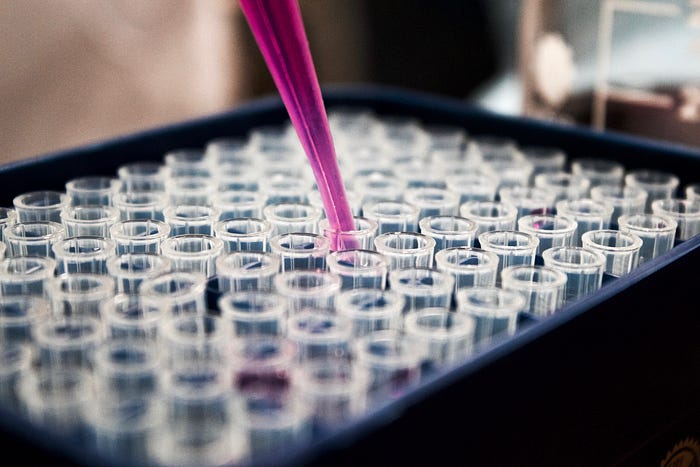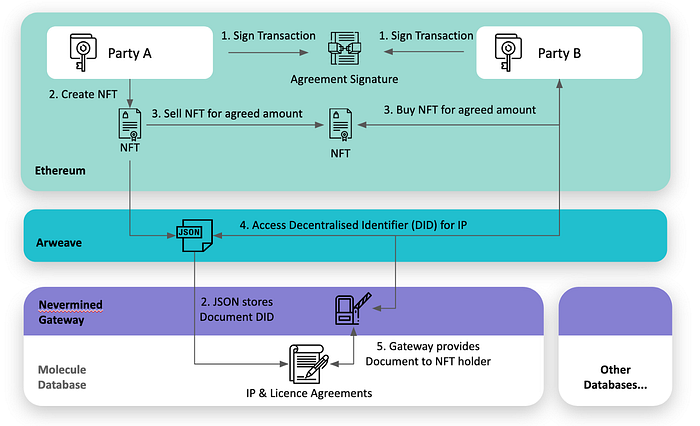Bringing NFTs into the science labs
Decentralized Access Control
4 min readNevermined reinvents IP usage in life science research with advanced NFTs

An ambitious briefing, with real life value, from an ambitious organisation: that’s what makes us tick at Nevermined. We’re extremely happy to announce that our partnership with Molecule has something truly unique to show for. It’s called VitaDAO, a decentralized organization set up to secure and commercialize IP for longevity researchers.
Calling VitaDAO ambitious is an understatement. Their mission is to help ensure that the IP related to the scientific field of longevity (i.e. the extension of human life- and health-span) can receive sufficient funding and protection for its creators. Cracking the code of living longer requires significant research. Particularly early stage research is crucial, as that is when truly innovative advancements happen. Unfortunately, that phase is severely underfunded. So VitaDAO was conceived to accelerate specifically the early stage research in an innovative way.
Their product is a platform that applies a decentralisation angle to the funding of this research, as well as to the management and sale of the IP connected to the research. Driven by the need to become a more efficient and open market, rather than the slow and tedious one that exists today, VitaDAO aims to disrupt all aspects of early stage Longevity research.
Want to live forever? There’s now an NFT for that…

In theory, the solution to the challenge is simple: create a token for the IP. That’s what NFTs are about, no? Then we can freely transfer the token and the corresponding IP.
Problem solved?
Well, not exactly. The complex conditions for storing, transferring and accessing IP-related files require more than an off-the-shelf, standard NFT solution.
First, there’s the very mundane issue of file format. The output of research generally is PDF documents, which obviously are not suitable for on-chain storage.
Second, this is a competitive and high-value industry, so there is the need for privacy for the parties involved in IP creation and transaction.
Finally, the issue of permanence is crucial: for the files, for the metadata describing the IP, and even for the data generated by continued future research. Simply put, it’s arguable that a Certificate of Authenticity for bio-pharma research has significantly more legal consequences than NFTs used for art purposes, for example. On top of the intricacies of digital IP often experienced in art, issuing a Certificate of Authority for bio-pharma research adds a layer of complexity.
NFTs, but on steroids
At Nevermined, we make modular software that can be deployed in hours with minimal tweaks for any use case with different types of assets, be it data, documents, algorithms, stats, analytics, reports, etc. The VitaDAO use case is exactly what Nevermined’s Access Control module was made for.
Access Control is a piece of software that allows anyone creating a digital asset, in this case represented by an NFT, to easily add conditions to the asset, such as pricing, verified users, privacy parameters, etc. The idea behind this is that the creator of the IP doesn’t just get ownership of the asset, but also full control over the conditions attached to the IP. This creates new opportunities for commercialization.
At the same time, the module acts as a Gateway, which guarantees that only parties that fulfil certain conditions (e.g. pay a certain amount of money or meet a set of predetermined reputation criteria) can get access to the underlying documents that reside off-chain. We call that File Access NFTs.
A key function of the Access Control module lies in its architectural capabilities. It is cross-tech-compatible, which means that it effortlessly allows apps to make the critical connections between a blockchain, the cloud and decentralised hosting. This is the only way to guarantee links between on-chain metadata and off-chain files, and also the only way to guarantee a Certificate of Authenticity with permanence, traceability and privacy built in.
In the case of VitaDAO, the Access Control uses Ethereum for the NFT and smart contract creation and deployment. Nevermined then connects to an Amazon S3 server, where the PDFs are stored and to an Arweave instance where the metadata are stored.

Mo’ Modules, Mo’ Ambitions
The fact that we have implemented our advanced NFT module in an ‘old school’ industry like life sciences is something we’re proud of. But we’re equally excited about the future possibilities of this partnership. We’re already thinking about what some of the other modules from the Nevermined stack could bring to the VitaDAO concept.
Take our Remote Computing functionality. It means that data owners no longer need to go through the laborious legal and technical process of copying and moving their valuable data to third parties in order to generate insights. Instead, Nevermined can safely and securely bring external algorithms to the data where it currently resides and do the computing ‘in situ’ so that the data does not need to move.
In this case, that would mean that under the VitaDAO framework, researchers can also get control and ownership of the data generated by their research and sell access to data scientists who can then deploy their algorithms for further insights into how we can live longer.
The result? New business opportunities for the life science community — now, that’s ambitious!

Questions? Want to discuss a similar use case? Get in touch.
Keen to read more about the Nevermined Functionalities? Start here.
For more on Molecule, visit their blog.
For more on VitaDAO’s mission and product, go to their blog.
Originally posted on 2021-08-26 on Medium.